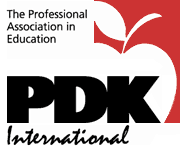Leadership
What Makes Education Successful?
“The quality of an education system cannot exceed the quality of its teachers and principals, since student learning is ultimately the product of what goes on in classrooms” OECD (2010), PISA 2009 Results: What Makes a School Successful? – Resources, Policies and Practices (Volume IV), pg 4.
Education is news. Given the links between the ability of a nation to be globally competitive and the quality of schools, governments, media and the community are focused on school and school system improvement. During the ‘Building Blocks for Education’: Whole System Reform international conference held in Toronto during September 2010 the emphasis was on lessons learned from successful school systems such as Finland and Singapore. As the Minister for Education for Singapore reminded us, “the system that out-teachers us today, out performs us tomorrow”.
Leadership is one of PDK’s three tenets. In this complex and multi-layered world, leadership is not the sole purview of a designated few but rather must be shared. Educational leadership is not confined to roles but shared across schools and school systems. Principals/school heads lead as do their assistant or vice-principals. There are divisional chairs, department heads, committee heads, consultants and team leaders who make differences to the quality of education in their school and school district. While administrators remain the second most important school-based factor, teachers are the most important school-based factor impacting student achievement (Hattie, 2009; Leithwood et al., 2008; Marzano, Waters & McNulty, 2005, 2006). As Barth reminds us, “All teachers must lead if all students are to excel.” (Barth, 2001: 85).
PDK promotes a shared vision that publicly-funded education matters. Leadership is realized through research and service.
For more information, visit the Ontario Ministry of Education .


